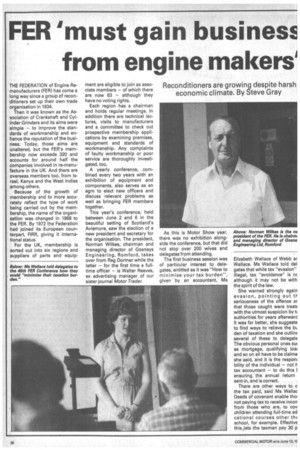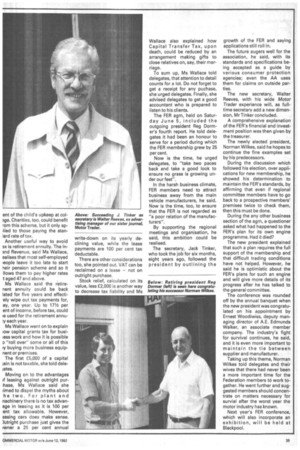FER 'must gain business from engine makers'
Page 32

Page 33

If you've noticed an error in this article please click here to report it so we can fix it.
Reconditioners are growing despite harsh economic climate. By Steve Gray
THE FEDERATION of Engine Remanufacturers (FER) has come a long way since a group of reconditioners set up their own trade organisation in 1934.
Then it was known as the Association of Crankshaft and Cylinder Grinders and its aims were simple — to improve the standards of workmanship and enhance the reputation of the business. Today, those aims are unaltered, but the FER's membership now exceeds 320 and accounts for around half the companies involved in re-manufacture in the UK. And there are overseas members too, from Israel, Kenya and the West Indies among others.
Because of the growth of membership and to more accurately reflect the type of work being carried out by the membership, the name of the organisation was changed in 1968 to the FEB. By 1972 the Federation had joined its European counterpart, FIRR, giving it international status.
For the UK, membership is sorted out into six regions and suppliers of parts and equip ment are eligible to join as associate members — of which there are now 63 — although they have no voting rights.
Each region has a chairman and holds regular meetings. In addition there are technical lectures, visits to manufacturers and a committee to check out prospective membership applications by examining premises, equipment and standards of workmanship. Any complaints of faulty workmanship or poor service are thoroughly investigated, too.
A yearly conference, combined every two years with an exhibition of equipment and components, also serves as an agm to elect new officers and discuss relevant problems as well as bringing FER members together.
This year's conference, held between June 2 and 6 in the beautiful setting of Scotland's Aviemore, saw the election of a new president and secretary for the organisation. The president, Norman Wilkes, chairman and managing director of Gosnays Engineering, Romford, takes over from Reg Dormer while the latter — for the first time a fulltime officer — is Walter Reeves, ex advertising manager of our sister journal Motor Trader. As this is Motor Show year, there was no exhibition alongside the conference, but that did not stop over 200 wives and delegates from attending.
The first business session was of particular interest to delegates, entitled as it was "How to minimise your tax burden—, given by an accountant, Ms
Elizabeth Wallace of Webb ar Wallace. Ms Wallace told del gates that while tax "evasion" illegal, tax "avoidance" is ric although it may not be with the spirit of the law.
She warned strongly again evasion, pointing out th seriousness of the offence ar that those caught were treat( with the utmost suspicion by t authorities for years afterward It was far better, she suggeste to find ways to relieve the Ix den of taxation and she outlim several of these to delegate The obvious personal ones al( as mortgage, qualifying loai and so on all have to be claime she said, and it is the respon: bility of the individual — not h tax accountant — to do this 1 ensuring the annual return sent in, and is correct.
There are other ways to c the tax paid, said Ms Wallac Deeds of covenant enable tha not paying tax to receive incon from those who are, to coy children attending full-time ad cational courses other thi school, for example. Effective this lets the taxman pay 30 p ent of the child's upkeep at col.1ge. Charities, too, could benefit rom this scheme, but it only ap'lied to those paying the stenlard rate of tax.
Another useful way to avoid 5x is retirement annuity. The In3nd Revenue, said Ms Wallace, ealises that most self-employed leople leave it too late to start heir pension scheme and so it !lows them to pay higher rates t aged 47 and above.
Ms Wallace said the retirenent annuity could be back lated for five years and effectiely wipe out tax payments for, ay, one year. Up to 171/2 per ent of income, before tax, could ke used for the retirement annuy each year.
Ms Wallace went on to explain low capital grants tax for busiless work and how it is possible D "roll over" some or all of this ly buying more business equipnent or premises.
The first £5,000 of a capital lain is not taxable, she told deleRites.
Moving on to the advantages if leasing against outright purbase, Ms Wallace said she limed to dispel the myths about he two. For plant and nachinery there is no tax advanage in leasing as it is 100 per :ent tax allowable. However, easing cars does make sense. )utright purchase just gives the kwn er a 25 per cent annual write-down on its yearly declining value, while the lease payments are 100 per cent tax deductable.
There are other considerations too, she pointed out. VAT can be reclaimed on a lease — not on outright purchase.
Stock relief, calculated on its value, less £2,000 is another way to decrease tax liability and Ms Wallace also explained how Capital Transfer Tax, upon death, could be reduced by an arrangement making gifts to close relatives on, say, their marriage.
To sum up, Ms Wallace told delegates, that attention to detail counts for a lot. Do not forget to get a receipt for any puchase, she urged delegates. Finally, she advised delegates to get a good accountant who is prepared to listen to his clients.
The FER agm, held on Saturday June 5, included the outgoing president Reg Dormer's fourth report. He told delegates it had been an honour to serve for a period during which the FER membership grew by 25 per cent.
Now is the time, he urged delegates, to "take two paces back and take a good look to ensure no grass is growing under our feet".
In the harsh business climate, FER members need to attract business away from the main vehicle manufacturers, he said. Now is the time, too, to ensure that the FER is not regarded as "a poor relation of the manufacturers".
By supporting the regional meetings and organisation, he said, this ambition could be realised.
The secretary, Jack Tinker, who took the job for six months, eight years ago, followed the president by outlining the growth of the FER and saying applications still roll in.
The future augers well for the association, he said, with its standards and specifications being accepted as a guide by various consumer protection agencies; even the AA uses them for claims on outside parties.
The new secretary, Walter Reeves, with his wide Motor Trader experience will, as fulltime secretary add a new dimension, Mr Tinker concluded.
A comprehensive explanation of the FER's financial and investment position was then given by the treasurer.
The newly elected president, Norman Wilkes, said he hopes to continue the fine examples set by his predecessors.
During the discussion which followed his election, over applications for new membership, he showed his determination to maintain the FER's standards, by affirming that even if regional committee members have to go back to a prospective members' premises twice to check them, then this must be done.
During the any other business section of the agm, a questioner asked what had happened to the FER's plan for its own engine programme. Had it died?
The new president explained that such a plan requires the full support of the membership and that difficult trading conditions have not helped. However, he said he is optimistic about the FER's plans for such an engine and will give more details of its progress after he has talked to the general committee.
The conference was rounded off by the annual banquet when the new president was congratulated on his appointment by Ernest Woodiwiss, deputy managing director of A.E. Edmunds Walker, an associate member company. The industry's fight for survival continues, he said, and it is even more important to maintain the tie between supplier and manufacturer.
Taking up this theme, Norman Wilkes told delegates and their wives that there had never been a more important time for the Federation members to work together. He went further and suggested members should concentrate on matters necessary for survial after the worst year the motor industry has known.
Next year's FER conference, which will also incorporate an exhibition, will be held at Blackpool.






















































